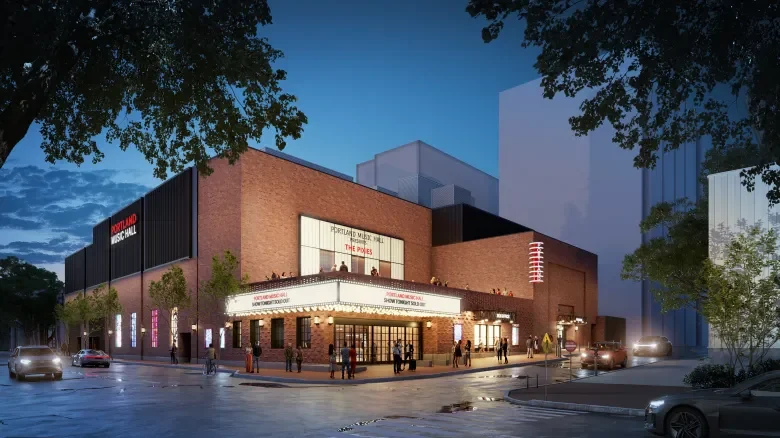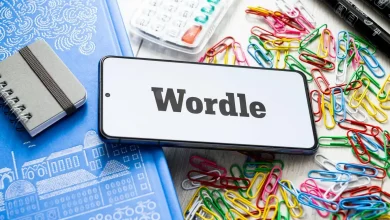Portland panel debates code changes that could make or break Live Nation venue

A rendering of the Portland Music Hall, a venue proposed in the heart of Portland by Mile Marker Investments and Live Nation. (Image by Leonardo Ruben Merlos)
Portland officials are considering two ordinance changes in response to an outcry against a proposed Live Nation concert venue downtown.
One proposal would expand the buffer required between large businesses with entertainment licenses, which would block the developers of the Portland Music Hall from building on their chosen site.
Another would create a new fee for large entertainment venues and direct the revenue to the city’s arts sector, a proposal endorsed by the developers.
The City Council enacted a moratorium in August on large performance halls and theaters. When the Housing and Economic Development Committee discussed these proposals Tuesday, some members signaled that they haven’t made up their minds about how to respond to the public debate about this venue.
“I don’t know if I’m there yet,” Councilor Regina Phillips said on the buffer zone. “I don’t think I am. I’m more than willing to get more information on it.”
Both will likely end up in front of the full City Council in the coming months.
“For this to die in committee, I think would be a really unwise political move,” Councilor Kate Sykes said. “It is an issue that the community has weighed in on, more so than any issue I’ve ever seen. I don’t think we should stop that process from happening.”
CHANGING THE BUFFER ZONE
The Portland Music Hall would be a 3,300-seat concert venue at the corner of Cumberland Avenue and Myrtle Street, just around the corner from Merrill Auditorium. The project is a joint venture between the concert giant Live Nation and Mile Marker Investments, a developer with a long history in Greater Portland.
Right now, the city requires a 100-foot buffer between businesses with entertainment licenses. Councilors Wes Pelletier and Pious Ali sponsored a proposal to expand that buffer to 750 feet for businesses with a capacity greater than 1,000, and eliminate it for smaller venues.
Tuesday’s meeting was the first public discussion of that proposal, and the councilors had mixed feedback on the concept.
“I feel like we are assuming that there’s a limited amount of demand for entertainment, but in reality, multiple venues in close proximity could create a kind of synergy,” Sykes said. “Our code invites density.”
Pelletier said he doesn’t see large venues side by side as the best approach for urban development.
“I don’t think we have competing issues here,” he said. “I think we have a different idea of what it means to adapt to a more dense population and how to accommodate that density.”
Kevin Kraft, the city’s planning director, said this ordinance would likely block ownership changes and prevent new entertainment licenses downtown if passed. He also noted that Portland’s downtown is more walkable and has more public transit than other neighborhoods.
“It will push venues to other areas of the city that may be less accessible,” he said.
The councilors asked staff to review the ordinance and answer technical questions raised in their discussion. They did not take public comment or vote on whether to send the proposal to the full City Council.
CREATING A NEW FEE
Another proposal would add a new fee for the Portland Music Hall but would likely not prevent its construction.
Councilors Sarah Michniewicz and Ben Grant proposed an ordinance that would require venues with a capacity of more than 2,000 people to pay 1% to 2% of ticket prices to the city as part of their entertainment license. The ordinance would apply to other venues besides the Portland Music Hall, such as Thompson’s Point and the Cross Insurance Arena.
Before the project stalled, the developers had already agreed to contribute $1 per ticket as a condition of approval, with half the money going to Greater Portland Metro to improve bus service, and the rest going to the city to benefit local arts organizations. Michniewicz said she wanted to codify that idea so it could be applied consistently in the future.
This ordinance would also allow large entertainment venues to offer in-kind contributions such as rehearsal space instead of cash.
Mary Costigan, an attorney for the developers of the Portland Music Hall, proposed some technical changes to the ordinance but said they “absolutely support” the concept.
The committee voted unanimously to send that proposal to the full City Council for consideration. Sykes said she will likely propose an amendment to increase the fees.
“We’ve got a situation here where we’ve got a ‘my way or the highway’ with these two potential changes to the code, with the buffer zone ordinance up next in our discussion,” Sykes said. “I recognize that the developer is hanging in there and really wants to do this project, and I think we really need to be looking at a higher fee here.”
The Housing and Economic Development Committee is scheduled to meet again Dec. 16 at 5:30 p.m.





